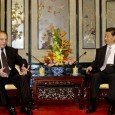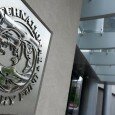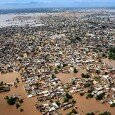By Mehtab Haider –
Pakistan has faced direct and indirect losses to the tune of over $102 billion in the ongoing war against terror in the last 14 years since 9/11
Pakistan has faced innumerable losses in the ongoing war against terrorism by rendering sacrifices of precious human lives as well as bearing massive economic losses.
This debate is over in our beloved country in the aftermath of recent blatant attack at school run by the Army in Peshawar whether it is U.S. war or our war that would be fought to save our next generation.
Pakistan has faced direct and indirect losses to the tune of over $102 billion in the ongoing war against terror in the last 14 years since 9/11, 2001 on several economic fronts. However, in the aftermath of Peshawar’s Army Public School (APS) incident, the nation stands united against extremists and fundamentalists whereby Prime Minister Nawaz Sharif unveiled National Action Plan to root out menace of terrorism with full vigor.
The National Counter Terrorism Authority (NACTA) will be fully activated with the objective to provide all out required resources to undertake full fledge action against militants.
“The Prime Minister has asked to operationalize NACTA by providing all out resources. The NACTA will utilize its allocated resources for the current fiscal year and if required more resources will be provided,” said Federal Minister for Planning and Development Ahsan Iqbal and added that no development and prosperity could be achieved without curbing terrorism.
He said that the government had provided all kind of resources for ongoing operation Zarb-e-Azb against militants so resources for NACTA would also be provided.
When Pakistan had decided to join U.S. led war against terrorism, Pakistan continued to bear direct and indirect losses of $102.5 billion (equivalent to Rs 8,264.4 billion) in last 14 years on different accounts of the national economy.
Renowned economist Dr Ashfaque H Khan, who had calculated economic losses after becoming an ally of war against terror first time when he was working as Advisor to Finance Ministry several years back, said that Pakistan had faced innumerable losses but the political leadership did not raise this issue at international forums forcefully.
Pakistan, he said, had received peanuts in return from U.S. and other western allies what we lost in this ongoing war against terror. Just imagine our sacrifices including the latest one in APS Peshawar, he said that U.S. had reimbursed through Coalition Support Fund (CSF) which was the money already incurred as expenses for launching offensive against militants. The CSF money reimbursed after huge lapse and without giving any interest on our borrowed money, he added.
On other hand, official estimates showed that Pakistan’s economy faced a loss of $2.67 billion in 2001-02 when Islamabad had taken decision to withstand with U.S. in its war against terror. These losses largely remained in the same range of $2.75 billion, $2.93, $3.41 billion and $3.99 billion in 2002-3, 2003-4, 2004-5 and 2005-6 respectively. These losses stretched to $4.67 billion in 2006-7 which was last fiscal year of Musharraf-Shaukat Aziz rule over this country.
The losses to Pakistan’s economy jumped to $6.94 billion in 2007-8, $9.18 billion in 2008-9 and $13.56 billion in 2009-10. The losses to the economy surged by touching a level of $23.77 billion in 2010-11 and $11.98 billion in 2011-12. These losses again decreased to $9.97 billion in 2012-13 and lowered to $6.69 billion in 2013-14.
This situation disrupted Pakistan’s normal economic and trading activities which not only resulted in higher costs of business but also created disruptions in the production cycles, resulting in significant delays in meeting the export orders around the globe. As a result, Pakistan products have gradually lost their market share to their competitors.
Consequently, economic growth slowed down, demand for imports reduced with declined tax collection and inflows of foreign investment. Investment outflow and negative trends of out sourcing of capital in Pakistan has further added to the woes of dwindling performance of the export oriented industry.
In order to assess the impact of the incidents of terrorism on the economy of Pakistan during the past several years, Finance Minister constituted a committee under the chairmanship of Adviser to Finance with Economic Adviser as Secretary/Member and also members from Ministries of Interior, Foreign Affairs, Commerce and Inter-Provincial Coordination. Ministries of Interior, Foreign Affairs, Finance, Commerce and other relevant departments have estimated the impact of conflict in Afghanistan and the ensuing terrorism on exports, foreign investment, privatization, industrial output, tax collection etc and updated the estimates for FY12, FY13 and FY14.
Pakistan needs enormous resources to enhance productive capacity of the economy by repairing damaged infrastructure and to create a favorable investment climate.
The security situation will be the key determinant of future flow of the investment. Pakistan’s economy needs an early end to the conflict in Afghanistan as well as its negative impact over regions bordering Afghanistan in the form of violent extremism and terrorism for revival of the economy and to keep stability in the system.
The conflict and instability in Afghanistan in the aftermath of 9/11 attacks and their regional implications had very negative repercussions for the years following the US invasion of Afghanistan not only saw a huge influx of Afghan refugees across the border into Pakistan but also witnessed a sudden spike in the frequency and scale of terrorist attacks in Pakistan.
The cumulative impact of these developments adversely impacted the overall growth rate in all major sectors of the economy.
Pakistan continues to pay a heavy price both in the economic and security terms due to this situation and a substantial portion of precious national resources both men and material, have been diverted to address the emerging security challenges for the last several years.
The rise of violent extremism and increase in terrorism in Pakistan due to instability in Afghanistan not only caused serious damage to Pakistan’s economy but has also been responsible for wide-spread human suffering due to indiscriminate attacks against the civilian populations.
![]() The writer is a senior economic correspondent based in Islamabad. He works for The News
The writer is a senior economic correspondent based in Islamabad. He works for The News































































































